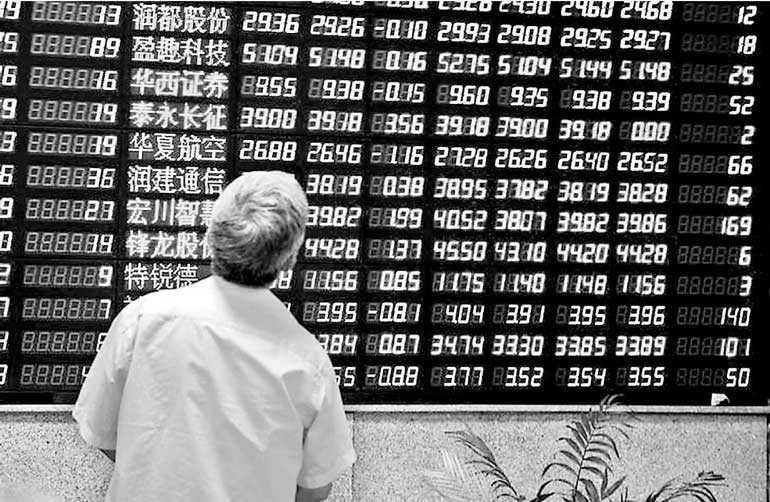Monday Feb 23, 2026
Monday Feb 23, 2026
Saturday, 21 July 2018 00:00 - - {{hitsCtrl.values.hits}}

TOKYO (Reuters): Asian shares pushed higher on Friday, clawing back earlier losses in volatile trade as China’s stocks recovered sharply and the yuan bounced from a one-year low with market participants suspecting state support for the currency.
The yuan took a beating earlier in the day after the central bank set a weaker fixing for the currency for the seventh straight session, adding to the anxiety in Asian markets, which remain sensitive to any sharp moves in the yuan.
MSCI’s broadest index of Asia-Pacific shares outside Japan was last up 0.55% after falling as much as 0.4% earlier.
Spreadbetters expected European stocks to open lower, with Britain’s FTSE falling 0.1% and Germany’s DAX and France’s CAC both shedding 0.25%.
The yuan’s latest bout of weakness, catalysed by concerns over the brewing China-U.S. trade war and a slowing Chinese economy, has seen the it shed 7.6% of its value against the dollar since the end of the first quarter of this year.
“There are several channels through which the yuan’s weakening is hitting Asian stocks. First, a weaker yuan challenges the competitiveness of other Asian economies,” said Shusuke Yamada, currency and equity strategist at Bank of America Merrill Lynch in Tokyo.
“The weaker currency also causes fears of capital leaving China and disrupting their capital markets, which could have knock-on effects on Asia. Lastly, a weaker yuan deepens trade war concerns.”
The yuan fell to as low as 6.8128 to the dollar in the onshore market, before reversing course to last trade at 6.777 for a gain of about 0.05%.
China’s stocks bounced back after the yuan made its about turn, its depreciation arrested after major state-owned Chinese banks were seen selling dollars in an apparent bid by authorities to prevent a rapid fall in the currency. Dominant in investors’ memories is China’s sudden devaluation of the yuan in 2015 and the subsequent turmoil in global financial markets then as investors worried about the stability of the world’s second-largest economy.
Elsewhere in Asia on Friday, Japan’s Nikkei was down 0.3% while Hong Kong’s Hang Seng and the Shanghai Composite Index both bounced out of negative territory to gain 0.45% and 2%, respectively.
“Investors do not know how far the yuan could fall,” said Ken Cheung, senior Asian FX strategist at Mizuho Bank in Hong Kong.
“(The authorities) might want to keep economic growth stable, and the direct impact of a weaker yuan could offset some negative impact from the trade war. But it will be hard to maintain confidence among foreign investors in purchasing yuan-denominated assets.” Asian stock markets were already edgy after Wall Street shares declined overnight amid the latest flare up in trade tensions, with the Dow shedding 0.53% and the S&P 500 declining 0.39%.
Worries about a full-blown global trade war are likely to persist as officials from the EU Trade Commission, due to arrive in Washington next week for trade talks, are said to be preparing a list of tit-for-tat actions in response to proposed U.S. tariffs on EU cars.
Against its peers, the U.S. dollar was on the defensive following U.S. President Donald Trump’s criticism of Federal Reserve policy.
Trump on Thursday criticised Fed policy and expressed concern about the potential impact of rising rates and a stronger dollar on the U.S. economy and American corporate competitiveness. The dollar index against a basket of six major currencies was 0.15% lower at 95.018 after being knocked down from 95.652, its highest level since July 2017.
The dollar had reached that high after Federal Reserve Chairman Jerome Powell expressed confidence in the U.S. economy and affirmed expectations that the central bank was on track to keep hiking interest rates gradually.
The euro added 0.2% to $1.1666, lifted from a three-week trough of $1.1575 set overnight. The single currency has lost about 0.3% this week.
The greenback lost 0.15% to 112.300 yen. It has been knocked away from one-year peak of 113.18 scaled on Thursday.
Brent crude futures rose 0.3% to $72.82 a barrel, maintaining their gains so far this week, after Saudi Arabia’s OPEC governor said the kingdom’s exports are likely to fall next month.